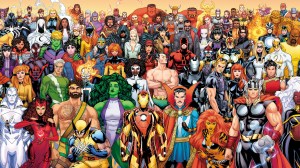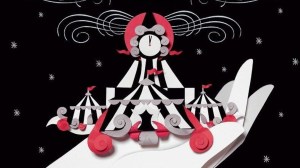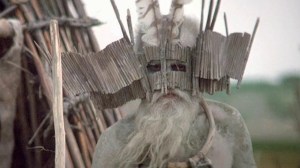Ethan Peck finally debuted as Spock in tonight’s episode of Star Trek: Discovery. ComicBook.com spoke to the actor about this episodes’ revelations and what comes next.
Videos by ComicBook.com
SPOILERS for Star Trek: Discovery Season 2, Episode 7, “Light and Shadows” follow.
Cmdr. Michael Burnham returned to Vulcan in this episode hoping that Amanda Grayson could aid in finding Spock. It turned out that Amanda has been hiding Spock in a crypt on Vulcan. Burnham finds Spock in a frantic state, repeating Vulcan mantras, passages from Lewis Carroll’s Alice in Wonderland stories, and a series of numbers.
The episode reveals that Spock has a learning disability, the Vulcan equivalent of dyslexia. With this knowledge, Burnham is able to decipher the numbers and discovers they’re coordinates for Talos IV. After a run-in with Section 31, the two of them set course for the planet from “The Cage.”
ComicBook.com spoke over the phone to Peck about what it is like to finally make his debut, stepping into Leonard Nimoy’s shoes, and what lies ahead for Spock.

We’re halfway through the season now and fans have been anticipating your debut. After waiting in the wings for so long, how does it feel to have your performance out there for people to see?
Ethan Peck: It feels really nerve-wracking. There’s obviously a great sense of relief, but also, you know, I hope to be liked and I think as artists, we always crave that sort of validation, and so there’s that desire. And also a great sense of relief that it’s finally going to be out there.
You’re stepping into big shoes playing Spock, but in this first episode, Spock isn’t exactly himself. Was that especially challenging for you?
EP: Yeah, absolutely it was, just as an actor, to be that vulnerable on camera is frightening. And then especially to be this typically stoic character and controlled character in this fervent state of existential dread or psychosis was really frightening because it’s still Spock. You can’t just go all fully emotional because he’s still half Vulcan and it’s going to come out in a way that’s still alien. And so figuring out that balance really took a lot of focus and we dealt with it with great care and while we were filming I was like, “Is this working? Is it believable? Does it feel like Spock?” Because I’m not really watching myself from the outside, I’m just having the experience that I believe is Spock. And so yeah, I definitely had a lot of anxiety about it.
This episode reveals something we didn’t know about Spock, that he has has a Vulcan form of dyslexia. Spock is a character who has attracted a number of neurodivergent fans. Is that something you were aware of going into this episode? And how to do you hope and feel fans will react to learning that Spock is neurodivergent himself?
EP: Oh, no. I wasn’t aware of that and that’s wonderful. I think it will be very affirming for a lot of marginalized people in that way, because I think it’s really healthy for those that might not be typical, you know, to have a role model out there who’s dealing with it themselves. I think it can be really comforting and help one identify with themselves. And so I’m really pleased to hear about that. That’s wonderful. And I’m honored to be able to bring that.
We also learn in the episode that Spock wants to return ot Talos IV, the planet from “The Cage.” Can you anything about what might be going through Spock’s head that would draw him back there?
EP: Well first of all, when I heard that we were going back to Talos, I was like, so beyond thrilled, like jumping up and down. What an amazing callback to “The Cage.” And to ie canon, weave it into the greater fabric that is Star Trek. But all I can say is that Spock believes something in Talos will help ground him. Right? I think he’s fighting to stay present, to stay in reality, where he’s had this very traumatic experience with the Red Angel that’s sort of shown something within himself, to himself that he can’t quite make sense of. And so I think there’s a comfort going there and knowing that it’s like a touchstone almost. That it will bring him back to who he is.
During the period leading up to Discovery‘s second season, showrunner Alex Kurtzman talked a bit about how the Spock of Discovery isn’t quite the Spock of The Original Series yet. Can you talk about what that means to you and how that factors into your performance?
EP: Well I think a lot of that work was done for me in the writing. I think we see an internal life and dialogue of Spock that we haven’t seen before that is highly emotional. He is really dealing with his human emotions at this point and so I guess you could say there are liberties taken with the amount of information shared about his internal life. But I don’t think it strays from who he is quintessentially. Which is, he is a human. And so that’s always been there. When I look at Nimoy’s performance in The Original Series, I see he was deeply empathetic, but chooses to operate on a logical level, as opposed to an emotional, perhaps histrionic level, which people tend to do in situations that are unknown or can be frightening. So I think we’ll see a lot more emotion in Spock in season two of Discovery.
Spock reunites with Burnham in this episode. Through the first half of the season, we’ve gotten her perspective on the relationship between her and Spock. Can you say anything about Spock’s version and how it may differ? Does he think of her as a sister as much as she thinks of him as a brother?
EP: That’s a complicated question to answer that I think we really spend the second season exploring. But I think at this point he views her as somebody who’s not useful to him. And I think we’ll discover that he’s very wrong.
The relationship between Spock and Capt. Kirk is one of the most storied in all of science fiction, but much less is known about Spock’s relationship with Pike. Can you say anything about Spock’s relationships with the two captains differ?
EP: I think between Spock and Kirk they’re almost like brother’s, right? It was such a magical trio between Kirk, McCoy, and Spock. They all brought these different sorts of archetypes of humanity, in my opinion. And between Spock and Pike, I think it’s less defined. There’s less of an exchange. I think that Captain Pike is an incredible leader, and Spock views him as that. And also, maybe secretly sees him as a mentor, as a human mentor. And that’s sort of what I imagine. That’s what I spoke with Anson [Mount] about when we talked about our relationship. So maybe Pike isn’t quite aware that Spock looks up to him in such a way.
Another big piece of this season is the involvement of Section 31, which is an organization introduced into the Star Trek universe much later on after The Original Series. Can you say anything about how Spock views this organization, which is so polarizing even among Starfleet officers?
EP: I’m not sure I can give you an answer to that. But it’s a great question.
Now that Spock has made his Discovery debut, are there any teases you want to leave fans with about where the season will take him next?
EP: I think that we all have an origin story and it’s always worth looking at.
*********************
New Star Trek: Discovery episodes become available to stream Thursdays at 8:30 p.m. ET on CBS All Access.








